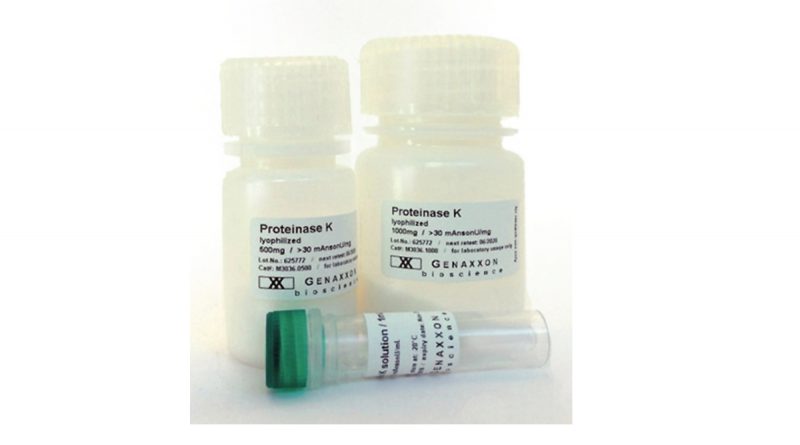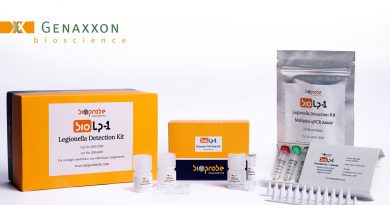Proteinase K Solution for PCR

The Proteinase K solution (20mg/mL) for PCR applications, manufactured by Genaxxon, is a non-specific serine protease with very high specific activity.
The Molecular Biology Grade Proteinase K Solution from Parengyodontium album (Tritirachium album) is a subtilisin-related serine protease and has an endo- and exoproteolytic activity. It is commonly used for protein digestion in DNA samples, DNA extraction, RNA purification and genotyping.
Proteinase K Solution (20mg/mL)
The standard concentration of Genaxxon’s Proteinase K solution (Cat N: M3037) is 20mg/mL. For the preparation of the solution, 20mg of Proteinase K is dissolved in 1mL pure (demineralised, DNAse and proteinase-free) water. The solution is stable at -20°C for two years. It can also be stored at +2°C to +8°C°C for several months.
Application examples based on 20mg/mL concentrations of Proteinase K (Cat N: M3037) dissolved in pure water or 50mM Tris, pH8.0, include:
• Isolation of genomic DNA from mammal cells or from mice tails
• Rapid isolation of genomic DNA as a PCR template from cell cultures
• Preparation of DNA for PFGE genotyping, lysis in agarose block
• Purification of mRNA prior to cDNA synthesis
• Purification of PCR reactions before cloning
• Purification of plasmid-DNA before in vitro transcription
• RNase inactivation in ribonuclease-protection-assays
Proteinase K from Tritirachium album
Proteinase K is frequently used for the digestion of proteins in cell lysates (tissue, cell culture cells) and for the release of nucleic acids, as it inactivates DNases and RNases extremely effectively. The digestion with Proteinase K for the purification of nucleic acids is carried out in the presence of EDTA (inhibition of magnesium-dependent enzymes).
Proteinase K exhibits a broad substrate specificity when activated by calcium (1 – 5mM). It degrades many proteins in their native state even in the presence of detergents after hydrophobic amino acids. If the incubation time is long and the protease concentration is high enough, proteins can be digested completely.
Examples of protein digest in DNA samples include:
- Genomic DNA Purification from bacteria: Bacteria from a saturated liquid culture are lysed and proteins are removed by a digest with 100μg/mL Proteinase K for 1 h at 37°C.
- Whole-Mount in situ hybridization and determination of RNAs in vertebrate embryos and isolated organs: Digest of the sample with e. g. 10μg/mL Proteinase K for 15 minutes at room temperature. The period of the treatment and/or the concentration of the enzyme has to be optimised.
- Prepration of DNA from cells or tissue for PCR: Cells or tissue is incubated overnight at 50°C with 100μg/mL Proteinase K.
- Isolation of vaccinia virus DNA: Digest the virus in a suspension with 2mg/mL Proteinase K for 4 h at 37°C.
Features
- Molecular Biology Grade Proteinase K Solution (20mg/mL)
- Source: Tritirachium album
- Host: Komagataella phaffli (Pichia pastoris)
- Activity: >40 units/mg protein (>600U/mL)
- Stable at -20°C for 2 years
- Can be stored at +2°C to +8°C° for several months
- Suitable for DNA and RNA extraction
Molecular Biology Grade Proteinase K for PCR applications is available from Genaxxon as a 20mg/mL Solution (M3037) or as Powder (M3036).
Produced and supplied by Genaxxon bioscience, researchers can rely on expert advice and support when inquiring about Proteinase K.
For more information please contact Genaxxon today or head to the online store and add to basket at Genaxxon’s webstore:






